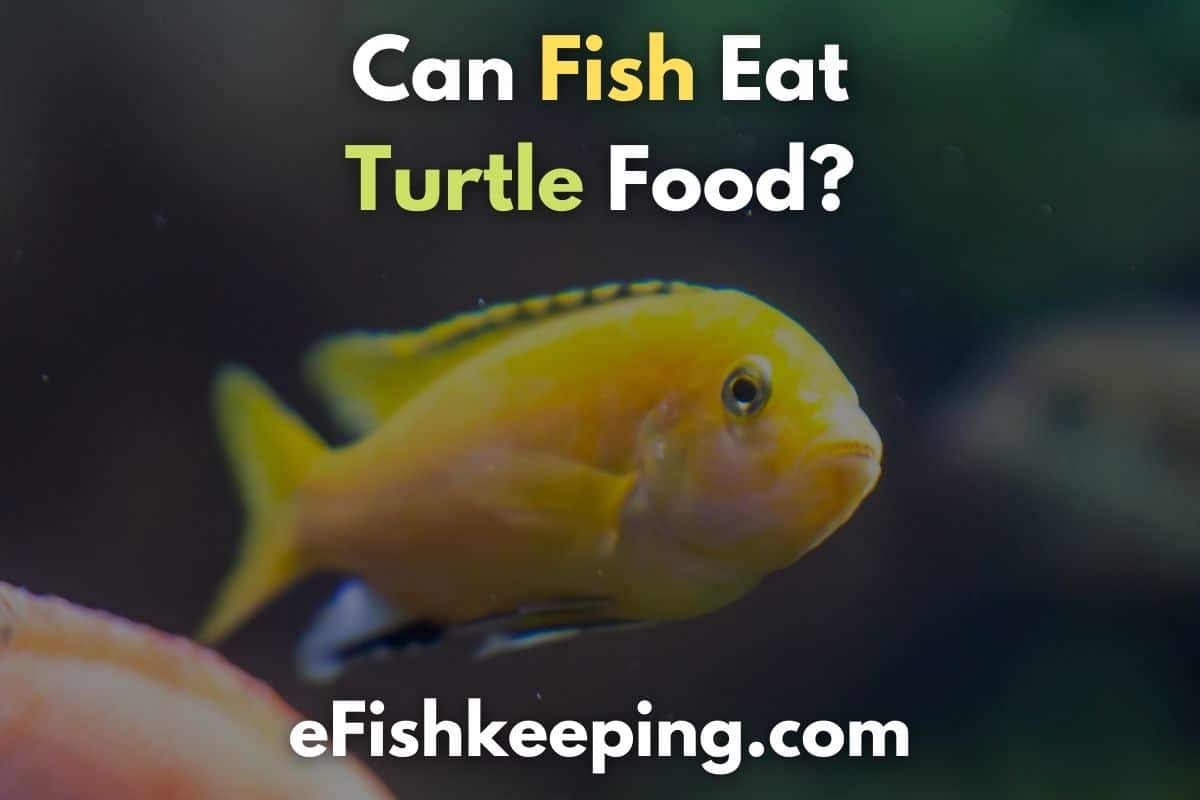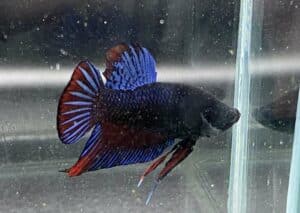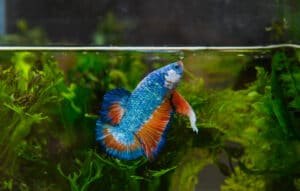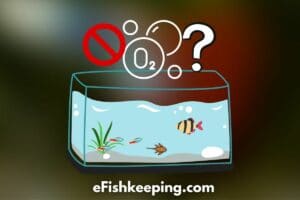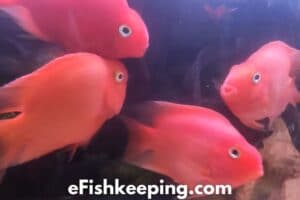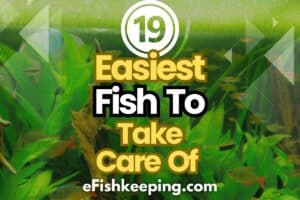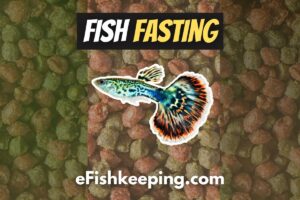Okay, so it’s the feeding time of your fish but the fish food containers are empty. Now what? You might not have enough time to go to the pet store and get a new pack of fish food containers. Right? Also, you might not want to let your fish be hungry for that long. In such a situation, if you have turtle foods in your home then they will most likely grab your attention.
So, can fish eat turtle food? Most fish can safely consume turtle food without issue, but only for a short period of time. Despite their comparable eating patterns, each species has different nutritional needs. As a result, feeding fish turtle food or vice versa might result in a nutritional imbalance.
Continue reading to discover more about whether you can feed your fish turtle food, what breeds of fish can eat turtle food, as well as some other foods that you can provide your fish?
#1. What Is Turtle Food?
Turtle food provides high-quality protein with low-fat content. Shrimp is a popular protein source for many food manufacturers. Vegetables, fiber sources, carbohydrate sources, and other ingredients are included in the meal.
When in captivity, turtles require both live and canned items in their diets. However, this varies by species and might include pellets or even fresh veggies. Earthworms, grubs, snails, beetles, and caterpillars, as well as grasses, fruit, berries, mushrooms, and flowers, are all eaten by terrestrial turtles.
Turtle diet also contains various minerals, vitamins, and vital amino acids. Be aware that different brands use multiple substances in their preparations. Always purchase high-quality food from a reputable retailer and read the ingredient list.
#2. What Will Happen If a Fish Eats Turtle Food?
Most of the time, turtle food will not cause harm to your fish at first. However, there are certain drawbacks to giving turtle food to fish. The biggest issue with feeding your fish turtle food is that the nutrients your fish needs aren’t found in the proper proportions.
Turtle diet has a lot of calcium, but fish food just needs a little. The most important vitamins for turtles are A and D, but fish also require A, C, D, E, and K.
The protein content of turtle food is 10-20% more than that of fish food. As a result, certain fish may experience problems. As you can see, there are significant variations between fish and turtle meals, and they cannot be used interchangeably for lengthy periods of time if you want to be safe.
#3. Why is it Not Safe to Feed Your Fish Turtle Food Long Term?
- Some turtle food may include parasites that turtles can readily cope with, but fish may not be able to.
- Turtle food is also high in protein, which might be detrimental to some fish since it contains more protein than they need.
- The nutritional value of turtle and fish diet differs. Food designed for one species may not be suitable for another.
#4. Why is Fish Food Critical for Maintaining the Health of My Fish?
Fish feed is crucial to the fish because it allows them to live and develop into healthy adults capable of reproducing. Typically, fish that feed well will become larger, more colorful, healthier-looking fish and have a longer lifespan than those who are given low-quality meals or have parasites.
#5. What Other Foods Can Fish Eat Besides Fish Food?
Many readily available things can be substituted for fish food, but, like turtle food, do not rely on these meals for an extended time.
Feeding Your Fish Live Food
Pallet food is inferior to live worms like mosquito worms, sea monkeys, daphnia, and tubifex. However, it’s best if you do not feed your fish live food on a daily basis since they can sometimes induce intestinal parasites.
Since 99 percent of fish will eat bloodworms, they are renowned as the ultimate fish meal. They may supply a lot of protein for your fish but be careful not to overfeed them. However, bloodworms should not be used as a whole diet. Instead, they should be given as a supplement to their regular flake or pellet diet.
Feeding Frozen Shrimp to Your Fish
Adult brine shrimp are a fantastic live meal for mature aquarium fish, while newly born brine shrimp, known as nauplii, are ideal for fry and young fish. Daphnia, sometimes known as water fleas, is a species of plankton that is commonly used to feed the fry. For aquarium fish, these organisms are a fantastic vitamin A and vitamin D source.
Shrimp are a significant source of food for both marine creatures and humans. As a result, if a shrimp population is brought into their environment, aquarium fish might become predators. As a result, frozen shrimp are preferred since there is no risk of a shrimp population exploding in your tank just to be consumed.
The most popular frozen shrimp to add to your fish’s diet are brine shrimp. Brine shrimp are a very efficient and energy-dense dietary source. In fact, the protein content of brine shrimp can reach 60% of their dry weight. This makes them an excellent alternative for facilitating the development of juvenile fish.
Freeze Dried Brine Shrimp are prepared with cutting-edge freeze-drying technology. These specially prepared and stored brine shrimp have become a popular favorite among fish enthusiasts as they are considered an excellent source of protein for your fish.
Feeding Your Fish Vegetables
Once a week, vegetables can be used in place of fish food. It improves the ability of fish to digest food. Blanched vegetables such as zucchini, lettuce, or spinach can be fed to your fish. Herbivorous fish require minerals and vitamins, which are abundant in vegetables.
Related Questions:
Can Goldfish Eat Turtle Food?
Goldfish can consume turtle food, but it’s not a good idea to offer it to them regularly. Different species require different nutrients to thrive. Many high-quality goldfish food companies can meet goldfish nutritional needs. Feed one of them to them on a regular basis. Goldfish require vitamin A, D, and other minerals to develop quicker and stay healthy.
Can Guppies Eat Turtle Food?
Guppies can consume turtle chow for about a week without becoming sick. However, feeding them for an extended period of time may cause them to gain weight. Female guppies that are too fat to give birth might die. As a result, make sure you feed your guppies appropriately.
Read my complete guide on fish fasting here.
Like most other fish, guppies have unique dietary needs despite their hardiness. As a result, long-term use of turtle pallets may indirectly influence their health.
Can Betta Fish Eat Turtle Food?
Betta fish can consume turtle food for a more extended period of time than other fish. However, they should be given high-quality turtle pallets. The protein level of the turtle fish diet is considerable. On the other hand, Bettas require higher protein meals to thrive.
Betta fish are carnivorous, meaning they feed on live insects, larvae, and worms. As a result, turtle fish can be used as a temporary betta substitute. However, providing your betta fish turtle food for more than a week is not suggested.
Can Cichlids Eat Turtle Food?
Cichlids are herbivores and cannot consume turtle food. Cichlids might have digestive issues when they eat protein-rich meals. Furthermore, because cichlids are more sensitive than other popular fish, it’s best not to disturb their familiar feeding routines and environments.
Conclusion
Overall, it is completely safe to feed most varieties of fish with turtle food. However, this should only be done for a short period of time.
If you run out of food for your fish and turtle food is your only option, remember to feed in small moderations and be sure to provide your fish with its regular diet as soon as possible.
If you don’t have turtle food handy, the next best alternative are small pieces of vegetables like zucchini or spinach to tie your fish over until you’re able to get their regular pellets or flakes.
Read Next:
Hi! I’m Praveen Ghoshal, the founder of eFishkeeping.com. Inspired by my Dad, I got interested in fishkeeping when I was a kid. Since then, I have been involved with this hobby. Currently, I have 3 fish tanks at our home, and I enjoy this hobby with my full family. Read more about me here.

